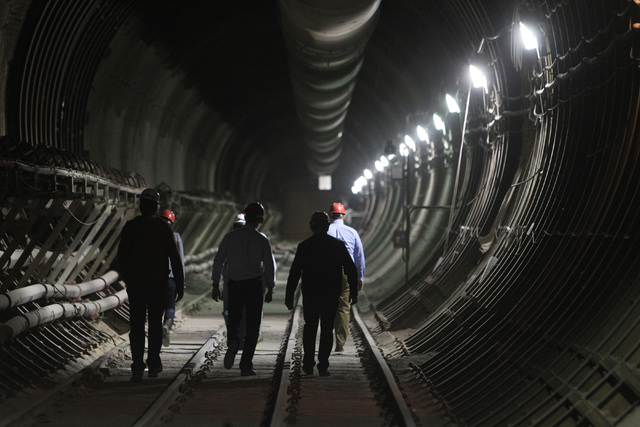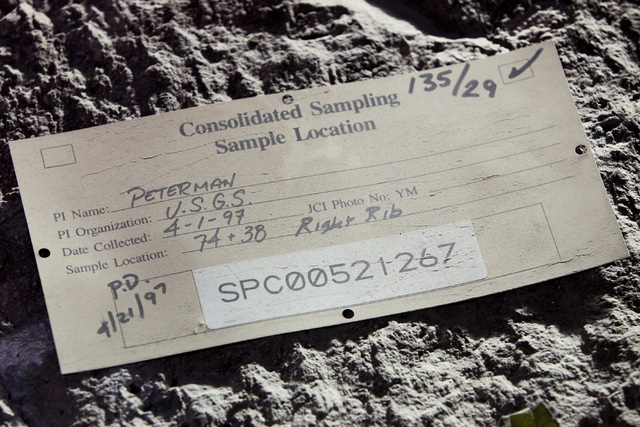Nevada panel, tribe call out NRC on Yucca groundwater contamination concerns


Federal plans to saddle Nevada with burying the nation’s most potent radioactive waste in Yucca Mountain were bemoaned Tuesday by the state Commission on Nuclear Projects and American Indians who would be most affected.
Questions about the potential for groundwater contamination were raised by Nevada’s Agency for Nuclear Projects Executive Director Robert Halstead. He took aim at the U.S. Nuclear Regulatory Commission’s recently released final installment to the environmental impact statement for the Yucca Mountain site, 100 miles northwest of Las Vegas.
The upshot, according to Halstead: NRC’s staff concedes the repository, if built, will likely release radioactive particles into the groundwater centuries after 77,000 tons of highly radioactive spent fuel from commercial power reactors and military operations is entombed in a maze of tunnels deep inside the mountain.

Although the NRC’s report says the contamination will be small, Nevada’s scientists believe it will substantially violate the 1 million-year standard at 2,000 years and contaminate traditional American Indian groundwater sources used by the Timbisha Shoshone tribe.
George Gholson, chairman for the tribe in Death Valley, Calif., said, “Our people have been on that land for generations and generations. We can’t leave the area and not be tied to that land. That’s our aboriginal territory.
“We’re asking down the road to accept the possibility of contamination,” he said. “We can’t pick up our reservation and move it.”
Gholson added, “We just can’t uproot our aboriginal culture, the use of the lands that we’ve enjoyed over many years prior to the United States even existing. We wandered around these lands. We hunted. We used the plants for foods that this could contaminate. And the water is so special for our people.”
Ian Zabarte, of the Western Shoshone government, noted in an email, “We are ready to challenge every conclusion in this document before a licensing board, with some of the top experts in the world and some of the best lawyers in the business.”
Halstead contends conclusions in the report are flawed because the NRC staff didn’t independently verify computer calculations of how the repository’s design will perform into the future.
“This will be a major debate in the trial-like hearings” if the licensing process resumes, Halstead said prior to the meeting.
The Obama administration at the urging of longtime Yucca Mountain critic Senate Minority Leader Harry Reid, D-Nev., has starved the Yucca Mountain Project of funding, retarding the NRC’s licensing proceedings. A change in the administration and U.S. Senate leadership could, however, breathe new life into the project.
Nevertheless, Halstead said Nevada has demonstrated that the 10,000-year Environmental Protection Agency standard of 15 millirem per year could be violated at between 700 to 800 years by radioactive particles escaping into the groundwater.
A millirem is a unit of radiation dose that a person would absorb from consuming contaminated groundwater or eating food grown from it. Halstead said the concern with violating the standard is that there would be an increased risk of latent cancer fatalities, genetic damage and nonfatal adverse health effects such as damage to a person’s immune system.
Among the issues will be how the repository is expected to perform if the effort to install titanium drip shields over the metal waste containers to prevent corrosion is delayed. That means between $5 billion and $15 billion would have to be spent if the drip shields are installed using robotic techniques under conditions that would be too radioactively “hot” and risky for humans.
The commission chairman, former U.S. Sen. Richard Bryan, said if Congress refused to fund drip shield installment decades later “that enhances the risk. … Then we would be in a position of we got it there but no money to do what we believe would be necessary to at a minimal standard protect the public health and safety.
“That strikes me as buying a pig in a poke,” Bryan said.
Contact Keith Rogers at krogers@reviewjournal.com or 702-383-0308. Find @KeithRogers2 on Twitter.












